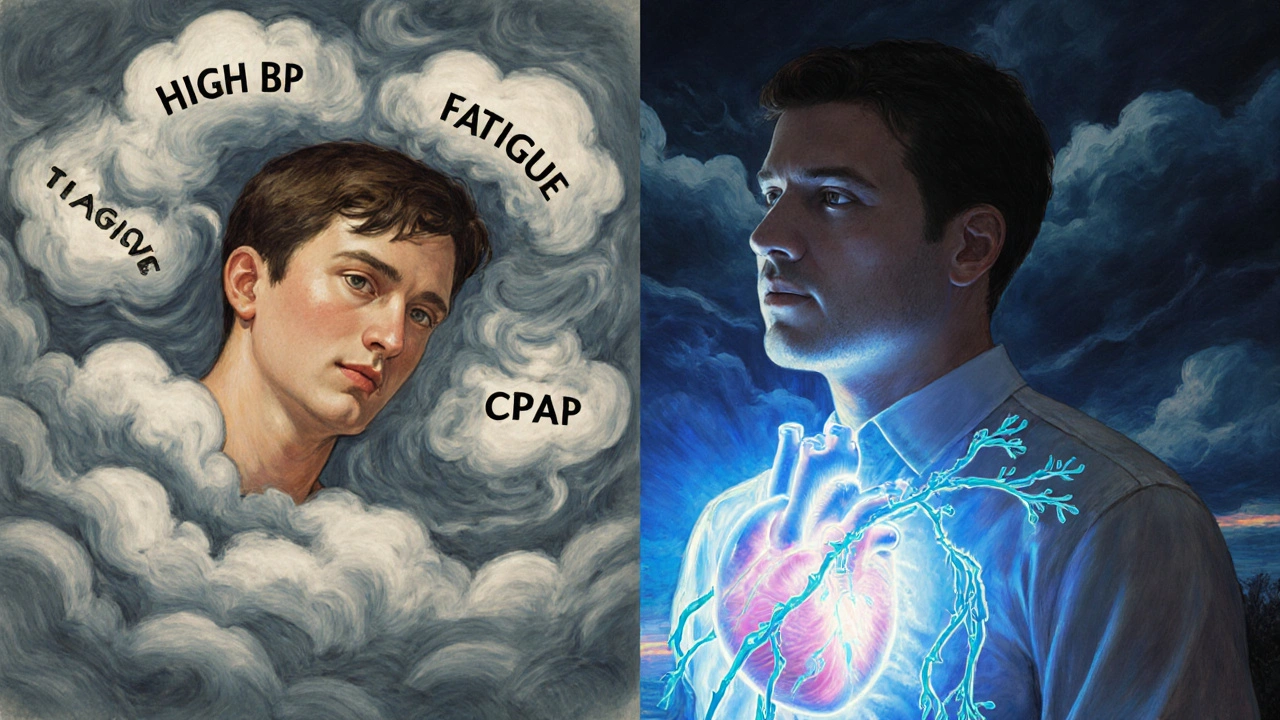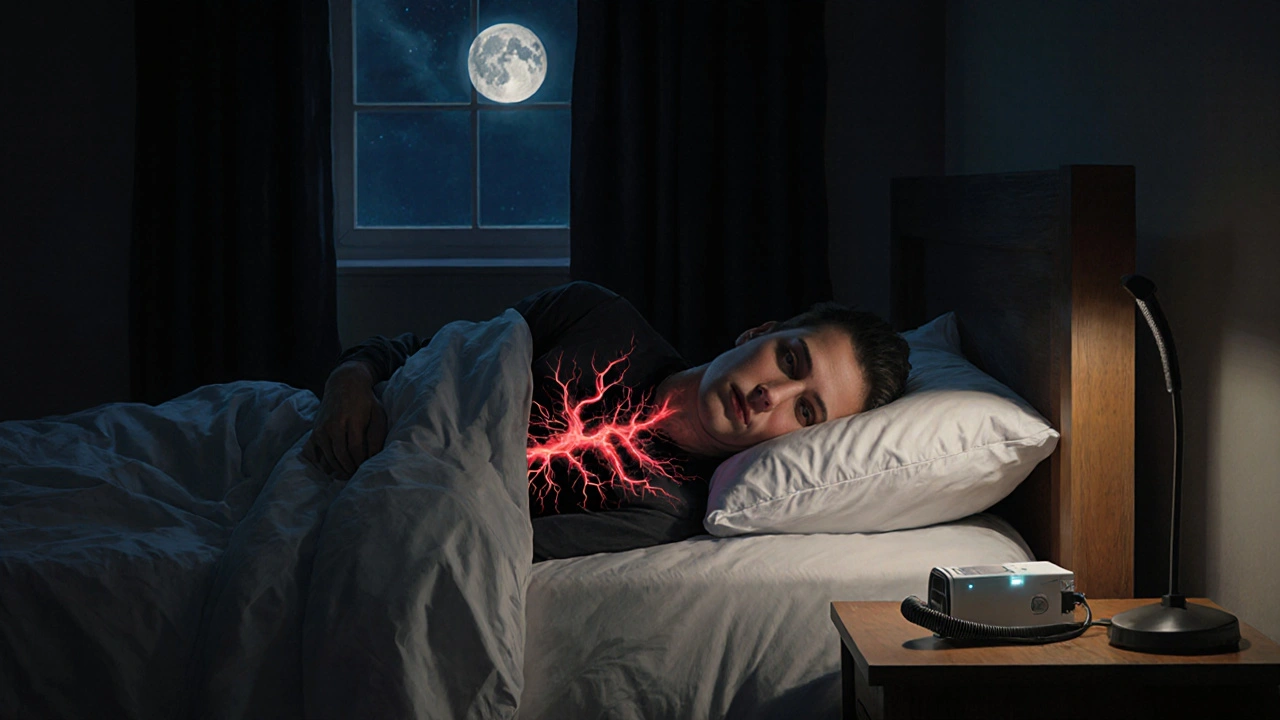Why Your Snoring Might Be a Heart Attack Waiting to Happen
Most people think snoring is just annoying - for their partner, or maybe themselves if they wake up with a dry throat. But if you snore loudly, gasp for air at night, or feel exhausted even after eight hours in bed, you might be dealing with something far more dangerous: obstructive sleep apnea. And this isn’t just a sleep problem. It’s a silent driver of high blood pressure, heart attacks, and strokes - especially if you’re under 40.
One in five adults has moderate to severe sleep apnea. And here’s the kicker: 80% of them don’t even know it. That’s because the symptoms hide in plain sight. You don’t wake up fully during an apnea episode - your brain just nudges you out of deep sleep enough to restart breathing. You might not remember it. But your heart? It remembers every single time.
How Sleep Apnea Turns Your Body Against Itself
Every time your airway collapses during sleep, your body goes into survival mode. Oxygen drops. Carbon dioxide builds up. Your brain screams for air. In response, your sympathetic nervous system fires like a fire alarm - flooding your bloodstream with stress hormones. Adrenaline spikes 2 to 4 times higher than normal during these episodes, according to European Society of Cardiology studies.
That surge isn’t harmless. It forces your blood pressure to skyrocket - even while you’re asleep. Normally, your blood pressure dips 10% or more at night. But in people with sleep apnea, 70-80% don’t experience that dip. Some even see their pressure rise. This pattern - called non-dipping or reverse-dipping - is one of the strongest predictors of heart disease and stroke.
And it’s not just pressure. Each apnea event creates a vacuum in your chest. That pulls harder on your heart, increasing its workload by 30-50%. Over years, that extra strain thickens your heart muscle, weakens its pumping power, and sets the stage for heart failure.
The Blood Pressure Connection You Can’t Ignore
If you have high blood pressure - especially if it won’t go down despite taking three or more medications - sleep apnea is probably part of the problem. Up to 80% of people with resistant hypertension have undiagnosed sleep apnea.
It’s not coincidence. The repeated oxygen drops trigger inflammation. Levels of C-reactive protein, a key marker of body-wide inflammation, jump 35-50% in untreated sleep apnea. That inflammation damages the lining of your arteries. Blood vessels stiffen. Flow-mediated dilation - a measure of how well your arteries relax - drops by 25-40%. This is how a simple breathing disorder turns into a ticking time bomb for your heart.
And the numbers don’t lie. People with moderate to severe sleep apnea are two to three times more likely to develop high blood pressure within just four to five years. The Wisconsin Sleep Cohort Study proved this over decades of tracking. What’s worse? Younger adults (ages 20-40) with sleep apnea have a 45% higher chance of developing hypertension than their peers without it. That’s not aging. That’s acceleration.

Heart Disease, Stroke, and the Midnight Danger
Heart attacks don’t just happen randomly. In people with sleep apnea, 26.5% of heart attacks occur between midnight and 6 a.m. - compared to just 16.5% in those without it. Why? Because your heart is under maximum stress during those apnea episodes. The combination of low oxygen, high adrenaline, and sudden pressure spikes creates the perfect storm for a clot or arrhythmia.
Obstructive sleep apnea increases your risk of coronary artery disease by 30%. For fatal heart events? That risk jumps to 60% higher. And if you’ve already had a heart attack, sleep apnea makes another one more likely.
Stroke risk is even scarier. Sleep apnea doubles your chance of having a first stroke. And if you’ve already had one? Your risk of another jumps 3.2 times. The worse your nighttime oxygen levels drop - especially if you spend more than 12% of your sleep below 90% saturation - the higher your chance of dying from that stroke. One study found a 4.3 times higher death rate in those with severe oxygen drops.
Heart Failure and Arrhythmias: A Dangerous Loop
It’s not just about arteries. Sleep apnea wrecks your heart’s rhythm. About half of all people with paroxysmal atrial fibrillation - that erratic, fluttering heartbeat - also have untreated sleep apnea. That’s nearly double the rate in people without it.
And here’s the twist: treating atrial fibrillation with ablation fails 30% more often in people with unmanaged sleep apnea. Your heart can’t heal properly if it’s still being starved of oxygen every night.
Heart failure and sleep apnea feed each other. Around 40-60% of heart failure patients also have sleep apnea. And if you don’t have heart failure yet? Sleep apnea makes you 140% more likely to develop it. That’s not a small risk. That’s a medical red flag.

Why CPAP Isn’t a Magic Fix - But Still Your Best Shot
You’ve probably heard about CPAP machines - the mask you wear at night that blows air to keep your airway open. It’s the gold standard treatment. But here’s the uncomfortable truth: CPAP only lowers blood pressure by 2-3 mmHg on average. That sounds tiny. And for some, it’s not enough.
But here’s what those numbers don’t show: CPAP slashes stroke recurrence by 37%. It improves heart failure outcomes. It makes ablation for AFib work better. It reduces the number of dangerous nighttime heart rhythms.
So why don’t more people use it? Because only 46% of users stick with it long-term. Most quit because the mask feels uncomfortable, the machine is noisy, or they don’t feel better right away. But improvement isn’t always immediate. It takes weeks. Sometimes months. And the benefits compound over time - especially for your heart.
There are alternatives: oral appliances, weight loss, positional therapy. But CPAP remains the most proven tool - if you can tolerate it. And if you can’t? Talk to your doctor. There are newer, quieter machines. Different mask types. And support programs that help people adapt.
Who Should Get Tested - And When
You don’t need to be overweight or snore like a chainsaw to have sleep apnea. But if you have any of these, get checked:
- High blood pressure that won’t respond to medication
- Atrial fibrillation or other irregular heart rhythms
- Been diagnosed with heart failure or had a stroke
- Chronic fatigue, even after sleeping 8 hours
- Waking up gasping, choking, or with a dry mouth
- Your partner says you stop breathing at night
Doctors now recommend screening everyone with cardiovascular disease using a simple tool called STOP-Bang. It asks eight quick questions - like do you snore? Are you tired during the day? Is your neck bigger than 17 inches? - and it catches 84% of moderate-to-severe cases.
And if you’re under 40 and have high blood pressure or unexplained fatigue? Don’t wait. The data shows sleep apnea hits younger people harder. It’s not just aging. It’s accelerating disease.
The Bottom Line: Your Heart Can’t Sleep Through This
Sleep apnea isn’t just about poor sleep. It’s a full-body stress test that happens every night. And your heart pays the price - silently, steadily, and sometimes fatally.
It’s not about being lazy. It’s not about being out of shape. It’s about a biological mechanism that, if left alone, turns your body’s rest into a battle zone. The good news? Once you treat it, your heart starts to recover. Blood pressure drops. Inflammation fades. Your rhythm steadies. Your risk of stroke and heart attack begins to fall.
Don’t wait for a heart attack to realize your snoring was a warning. If you’ve got risk factors - or just feel like you’re never truly rested - ask your doctor for a sleep evaluation. Your heart will thank you.
Can sleep apnea cause high blood pressure even if I’m young?
Yes. Studies show adults aged 20-40 with untreated sleep apnea have a 45% higher risk of developing high blood pressure compared to peers without it. This suggests sleep apnea doesn’t just accompany aging - it accelerates cardiovascular damage in younger people.
If I use a CPAP machine, will my blood pressure go back to normal?
CPAP typically lowers blood pressure by only 2-3 mmHg on average, which might seem small. But the real benefit is in long-term protection: it reduces stroke recurrence by 37%, improves heart failure outcomes, and makes heart rhythm treatments more effective. Consistent use over months leads to better overall cardiovascular health, even if BP doesn’t drop dramatically.
Is sleep apnea only a problem for overweight people?
While 70% of obstructive sleep apnea cases are linked to obesity, it can affect anyone - including thin people, women, and younger adults. Factors like jaw structure, neck anatomy, and genetics also play major roles. Don’t assume you’re safe just because you’re not overweight.
How do I know if I have sleep apnea if I don’t snore?
Not everyone with sleep apnea snores loudly. Other signs include waking up gasping, chronic daytime fatigue, morning headaches, dry mouth upon waking, difficulty concentrating, or being told you stop breathing during sleep. If you have any of these - plus high blood pressure, heart disease, or atrial fibrillation - get screened.
Can treating sleep apnea help if I already had a heart attack or stroke?
Yes. Treating sleep apnea after a heart attack or stroke significantly lowers the risk of another event. Studies show CPAP reduces stroke recurrence by 37%. It also improves heart function and response to medications. If you’ve had a cardiovascular event and feel tired during the day, ask your cardiologist about sleep apnea testing.
If you’ve been told your blood pressure is hard to control, or you’ve been diagnosed with heart disease, atrial fibrillation, or stroke - don’t overlook sleep. Your next step isn’t another pill. It’s a sleep evaluation. The data is clear: untreated sleep apnea undermines every other treatment you’re doing for your heart.


Andrew Forthmuller
November 13, 2025 AT 03:46Elizabeth Buján
November 13, 2025 AT 07:40Arpita Shukla
November 14, 2025 AT 19:23vanessa k
November 16, 2025 AT 07:10manish kumar
November 18, 2025 AT 05:27Benjamin Stöffler
November 19, 2025 AT 17:46Mark Rutkowski
November 19, 2025 AT 23:55Ryan Everhart
November 20, 2025 AT 22:44David Barry
November 22, 2025 AT 00:28Nicole M
November 22, 2025 AT 21:21